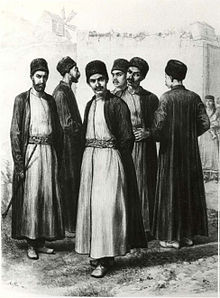Crimean Karaite

Karaite men in traditional garb, Crimea, 19th century.
|
|
| Total population | |
|---|---|
| ≈2,000 | |
|
|
1,196 |
|
|
715 |
|
|
346 |
|
|
241 |
|
|
205 |
| Languages | |
| Karaim, Lithuanian, Polish, Russian | |
| Religion | |
| Karaite Judaism, Christianity | |
| Related ethnic groups | |
| Turkic peoples | |
The Crimean Karaites or Krymkaraylar (Crimean Karaim: Кърымкъарайлар sg. къарай – qaray; Trakai Karaim: sg. karaj, pl. karajlar, Hebrew: קראי מזרח אירופה, Turkish: Karaylar), also known as Karaims and Qarays, are an ethnic group derived from Turkic-speaking adherents of Karaism in Central and Eastern Europe, especially in the territory of the former Russian Empire. "Karaim" is a Russian, Ukrainian, Lithuanian, and Polish name for the community.
Turkic-speaking Karaites (in the Crimean Tatar language, Qaraylar) have lived in Crimea for centuries. Their origin is a matter of great controversy. Some regard them as descendants of Karaite Jews who settled in Crimea and adopted a form of the Kypchak tongue (see Karaim language). Others view them as descendants of Khazar or Cuman, Kipchak converts to Karaite Judaism. Today many Karaim deny ethnic Semitic origins and identify as descendants of the Khazars. Some specialists in Khazar history question the Khazar theory of Karaim origins, noting the following:
Some modern Karaim resist being identified as Jews, emphasizing their Turkic heritage and claiming they are Turkic practitioners of a "Mosaic religion" separate and distinct from Judaism. Miller says that Crimean Karaites did not start claiming a distinct identity apart from the Jewish people before the 19th century, and that such leaders as Avraham Firkovich and Sima Babovich encouraged this position to avoid the strong anti-Semitism of the period.
...
Wikipedia
